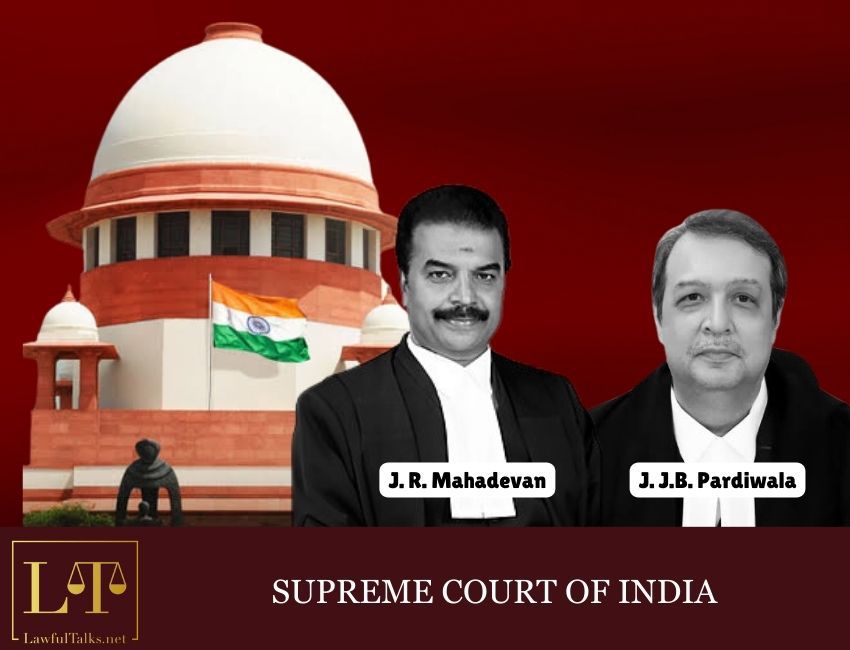Allahabad HC Sets Aside Afzal Ansari's Conviction, Allows Him to Continue as MP

The Supreme Court reiterated the discretionary power conferred upon courts under Section 319 of the Code of Criminal Procedure (CrPC), empowering them to summon any person named in a First Information Report (FIR) but not implicated in the chargesheet as an additional accused to face trial, provided that, during the trial, evidence surfaces against the proposed accused.

The bench comprising Justice J.B. Pardiwala and Justice R. Mahadevan were hearing an appeal challenging the decision of the Madhya Pradesh High Court. The High Court had declined to interfere with the order of the Trial Court summoning the Appellants as additional accused under Section 319 of the CrPC. While dismissing the appeal, the Supreme Court laid down principles of law governing the exercise of powers under Section 319 of the CrPC.
The present Petitioners were named in an FIR where they were charged under Sections 302, 307, 147, 148, and 149 of the Indian Penal Code (IPC). At the end of the investigation, the Investigating Officer filed a closure report exonerating the Petitioners from the alleged offense. However, during the trial, new evidence from witness testimonies led the Trial Court to summon the two Petitioners as accused under Section 319 of the Code to face trial along with the other co-accused.
The Petitioners, dissatisfied with the order of the Trial Court, approached the High Court. The High Court rejected their Criminal Revision Application and upheld the Trial Court's decision. Aggrieved by the same, the present petition was filed before the Supreme Court.
The key contention submitted by the Petitioners was that the Trial Court and the High Court did not consider the closure report filed by the Investigating Officer exonerating the Petitioners from the alleged offense.
The bench did not find any merits in the contention and proceeded to highlight the power of the Trial Court by stating, “if the Trial Court finds that a particular person should be summoned as accused, even though not named in the charge-sheet, it can do so.”
The Court held that the trial court's discretionary power to summon a person under Section 319 CrPC may be exercised during the course of the trial if new evidence emerges implicating the proposed accused.
The bench observed that, “Thus, even in a case where the stage of giving opportunity to the complainant to file a protest petition urging upon the trial court to summon other persons as well who were named in the FIR but not implicated in the charge-sheet has gone, in that case also, the Court is still not powerless by virtue of Section 319 CrPC and even those persons named in the FIR but not implicated in the chargesheet can be summoned to face the trial provided during the trial some evidence surfaces against the proposed accused.”
Thus, after due consideration, the bench did not find any error of law in the High Court’s judgement and further laid down the following principles of law as regards Section 319, which are as follows:
“a. On a careful reading of Section 319 of the CrPC as well as the aforesaid two decisions, it becomes clear that the trial court has undoubted jurisdiction to add any person not being the accused before it to face the trial along with other accused persons, if the Court is satisfied at any stage of the proceedings on the evidence adduced that the persons who have not been arrayed as accused should face the trial. It is further evident that such person even though had initially been named in the F.I.R. as an accused, but not charge sheeted, can also be added to face the trial.
b. The trial court can take such a step to add such persons as accused only on the basis of evidence adduced before it and not on the basis of materials available in the chargesheet or the case diary, because such materials contained in the charge sheet or the case diary do not constitute evidence.
c. The power of the court under Section 319 of the CrPC is not controlled or governed by naming or not naming of the person concerned in the FIR. Nor the same is dependent upon submission of the chargesheet by the police against the person concerned. As regards the contention that the phrase 'any person not being the accused' occurred in Section 319 excludes from its operation an accused who has been released by the police under Section 169 of the Code and has been shown in column No. 2 of the charge sheet, the contention has merely to be stated to be rejected. The said expression clearly covers any person who is not being tried already by the Court and the very purpose of enacting such a provision like Section 319(1) clearly shows that even persons who have been dropped by the police during investigation but against whom evidence showing their involvement in the offence comes before the Criminal Court are included in the said expression. c. It would not be proper for the trial court to reject the application for addition of new accused by considering records of the Investigating Officer. When the evidence of complainant is found to be worthy of acceptance then the satisfaction of the Investigating Officer hardly matters. If satisfaction of Investigating Officer is to be treated as determinative then the purpose of Section 319 would be frustrated.”
Case Title: Omi @ Omkar Rathore & Anr. v.The State Of Madhya Pradesh & Anr., SLP (CRL.) No(s). 17781 of 2024

Akshaj Joshi
Law Student
Latest Posts
Categories
- International News 19 Posts
- Supreme Court 390 Posts
- High Courts 383 Posts



















































































































































































































































































































































































































































































































































































































































































































































































































